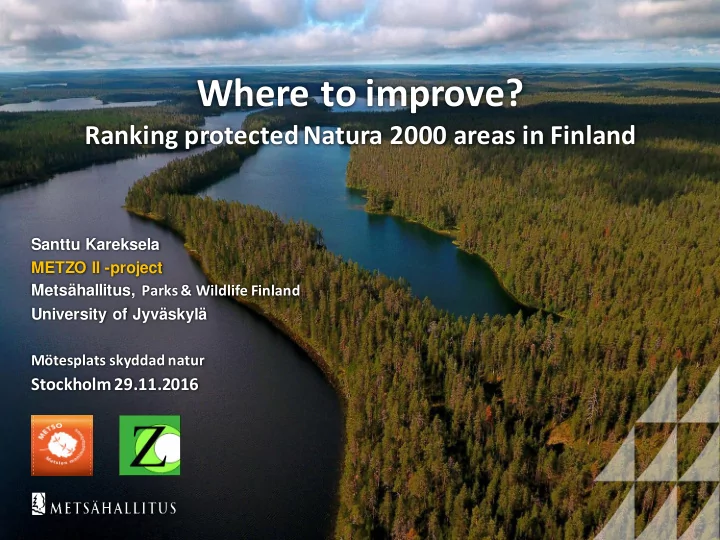

Where to improve? Ranking protected Natura 2000 areas in Finland Santtu Kareksela METZO II -project Metsähallitus, Parks & Wildlife Finland University of Jyväskylä Mötesplats skyddad natur Stockholm 29.11.2016
Why do we need systematic analyses? To avoid harmful opportunism in decision-making To find the balance! To define and recognize opportunities
Ranking protected Natura 2000 areas Goals and Targets Mapping restoration potential Prioritizing N2K areas for restoration based on their potential Identifying low hanging fruits conceptually and on the map COST-EFFECTIVELY IMPROVE THE PERSISTENCE OF BIODIVERSITY
Ranking protected Natura 2000 areas Main elements from databases and Finnish Restoration Prioritization -project 100 habitat experts working group defining: Current methods Effects of the methods Costs of the methods How good they will be How much they are improved Fine scale geographic information for 67 N-habitat types + threatened species + current state for each habitat patch from the Parks & Wildlife habitat database
Ranking protected Natura 2000 areas with respect to their improvement potential
ZONATION Conservation planning software Zonation Ranks areas (pixels to any size planning units) according to their conservation value, based on: – Aims to maximize ecological value of the solution (set of areas) considering simultaneously data for multiple habitats and species – Complementarity (identifying what is missing or poorly represented) – Connectivity, Condition, Cost-effectiveness Produces data for trade-off evaluation (how the solution changes / area / costs) Kareksela et al. 2013 Conservation Biology
What we want (in a nutshell) Identify a set of areas with habitat and species combinations That best complements what is already in good state That emphasizes areas/habitats where recovery is realistically achievable That has a high and ecologically relevant overall effect of improvement AVOIDING HARMFUL OPPORTUNISM: RARE vs COMMON EXPENSIVE vs CHEAP
What we get
MAPS – whole N2K areas ranked according to their improvement potential Low potential High potential Already good condition 20 km
MAPS – showing also more detailed priorities Low potential High potential Already good condition 20 km
Comparison of trade-offs
Graphical analysis of the performance COMPARING TRADE-OFFS Representativenes of habitats at the analysis area The overall representation level of natura habitats on protected N2K sites Average across habitats Areas not to be improved Areas for improvement Total area included in the analysis = protected N2K areas in Finland
Graphical analysis of the performance COMPARING TRADE-OFFS Representativenes of habitats at the analysis area The overall representation level of natura habitats on protected N2K sites Areas not to be improved Areas for improvement Total area included in the analysis = protected N2K areas in Finland
Graphical analysis of the performance COMPARING TRADE-OFFS Representativenes of habitats at the analysis area The overall representation level of natura habitats on protected N2K sites Areas not to be improved Areas for improvement Total area included in the analysis = protected N2K areas in Finland
Graphical analysis of the performance COMPARING TRADE-OFFS Representativenes of habitats at the analysis area The overall representation level of natura habitats on protected N2K sites Areas not to be improved Areas for improvement Total area included in the analysis = protected N2K areas in Finland
Finnish perspective or EU biogeographic priorities
Some ideas
Some ideas With the current techniques we can perform analyses that consider both the outcome and the amount of improvement simultaneously balancing both of them with costs. Quite nice! Proper analyses also enable proper investigation of the trade-offs, which helps to implement the solutions! Perspective differences between scales: Counties/regions/provinces vs National scale vs EU scale With the help of proper systematic analyses: Possibilities to make ecologically significant improvements cost-effectively
Kotiaho, Atte Moilanen, Ninni Mikkonen, Niko Leikola More information Presented analyses and Zonation: me, santtu.kareksela@metsa.fi Zonation method: Atte Moilanen, atte.moilanen@helsinki.fi Our prioritization project, (http://www.metsa.fi/web/en/zonation)
Recommend
More recommend